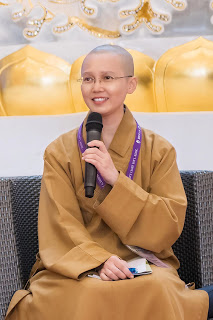
Speaker: Ven. You Deng
Fo Guang Shan Dong Zen Buddhist College, Malaysia
1. Introduction
Auspicious Greetings to all dharma friends!
This is You Deng from Dong Zen Buddhist College in Malaysia.
Nice to meet you all again.
This time, I would like to share the story of The Ten Great disciples of Buddha.
Each of them has own expertise and achievements.
They have an indelible credit for propagating the Buddha’s teachings.
To this day, they are the same as the Buddha, and will be admired by future generations.
2. Sariputra: Foremost in Wisdom

Sariputra’s Upbringing & Renunciation
Sariputra was one of the top disciples of the Buddha who foremost in Wisdom.
He was born into a noble Brahman family in Magadha (southern India). His father was a noted Brahmin scholar. When his mother conceived him, she had extraordinary wisdom, which was believed to be influenced by the baby in her womb, Sari was his mother’s name.
He displayed great wisdom since a young age. At 8, Sariputra was able to understand all the books he read. At 20, he left his home and began to search for The Truth.
Sariputra and Maudgalyayana were childhood friends, both know life is impermanent and were determined to find way to liberate from suffering.
They became a disciple of a Brahmin scholar, Sanjaya. However, they were not satisfied with the teaching and eventually left Sanjaya.
After they left Sanjaya, Sariputra encountered the monk Assaji one of the Buddha’s First five arhat disciples, while walking on the street. Assaji has attained arahatship after several years of practices and listening to Buddha’s teaching Four Noble Truth.
Sariputra noticed the serene look of the monk and approached the venerable and respectfully asked him:
“Who is your Teacher?” and Assaji told Sariputra
“My teacher is Shakyamuni Buddha.”
“What doctrine does your teacher teach?” Assaji shared with Sariputra
“All things arise and extinguish due to the causes and conditions”
Upon hearing the teaching, Sariputra was touched and attained his first enlightenment. Sariputra shared with Maudgalyayana his encountered with Assaji.
Both Sariputra and Maudgalyayana knew Buddha was the True Teacher, together with 200 disciples they went to Bamboo-grove visit Buddha and ordained as monks under the Buddha.
After Sariputra and Maudgalyayana ordained, the Buddha declared them his two chief disciples. Sariputra was said to have attained enlightenment as an arhat two weeks after ordaining.
Sariputra’s Past Life
Regarding Sariputra’s past life, about sixty aeons ago, Sariputra vowed to practise the way of Bodhisattva and offer alms to the needy. He was willing to give away all his property, even his body and life.
A deva decided to test Sariputra’s determination to achieve Bodhisattvahood.
One day, a deva disguised himself as a young man. He cried sadly when he saw Sariputra walking towards him. Sariputra approached him and asked what had happened.
The young man said : “My mother is suffering from an incurable disease and the doctor said that in order to cure her disease, an eyeball of a monk is needed to blew medicinal herbs. But where can I find a monk’s eyeball?” replied the young man who was still crying sadly.
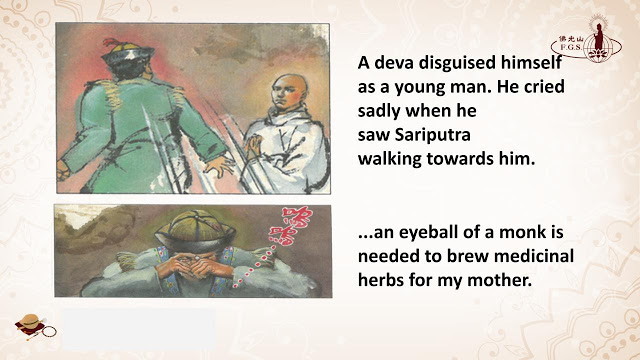
Sariputra decided to give his eyeball to the young man. Thinking he would still be able to see with the other eye. Therefore, despite the pain, Sariputra dug out his left eyeball and gave it to the young man. However, the young man said : “Oh no! The doctor said that, only the right eyeball can cure my mother.”
Sariputra was very shocked to hear that, but he only blamed himself for not asking the young man before digging out his eyeball. Determined to help the young man, Sariputra bravely dug out his right eyeball.
Without thanking Sariputra, the young man took the eyeball and smelled it. Then he threw it on the ground and scolded Sariputra: “Your eyeball is very smelly! How can it be used to blew medicinal herbs for my mother? “After that, he even trampled on the eyeball.
Though Sariputra could not see, he could still hear. He then thought, “It is difficult to save all beings and be a bodhisattva. I think I’d better concentrate on the practice of self-cultivation!”
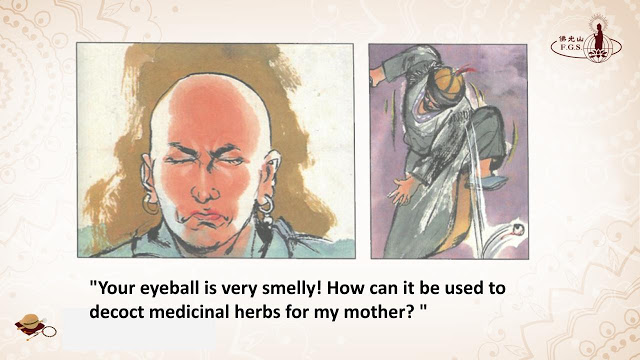
Just then, many devas appeared in the sky. They said to Sariputra, “Don’t be dejected. What has just happened is only our arrangement to test your determination to become a bodhisattva. You should bravely progress on.”
Upon hearing that, Sariputra resumed his compassion to save others. For the next sixty aeons, he never stopped his spiritual practices. During the lifetime when he met Buddha, he was able to achieved final enlightenment and also attained divine vision.
Sariputra’s Roles in the Sangha
Buddha trusted Sariputra very much after Sariputra became His disciple.
Once, Buddha assigned Sariputra to propagate Dharma in the northern part of the country where heretical groups could be found everywhere and at the same time, to supervise the construction of Jetavana Vihara, a park belonged to Anathapindika, a wealthy elder, brought it from the prince and gave it to the Buddha for the use by the Sangha.
The heretical groups were jealous of Buddha’s development of Dharma in the northern part and against the building of Jetavana. The well-read Sariputra, who was also an expert in heretical books and records, successfully defeated the heretics in a debate session with a large panel of Heretics in northern part. As a result, many people, including some of the heretics, were converted to Buddhism. The construction of Jetavana was also completed smoothly.
When the monk Devadatta created a schism in the Buddha’s monastic community. He demanded Buddha gave him the authority to lead the Sangha community. When Buddha refused, Devadatta betrayed Buddha and led some of the Buddha’s disciples away. Sariputra manage to get the disciples return to Buddha Community.
Though Sariputra, who had great wisdom and divine power, was a chief disciple of the Buddha, he always followed and obeyed the Buddha’s instructions. When Buddha’s son, Rahula, joined the Sangha he asked Sariputra to be his teacher.
Sariputra as a Teacher
One day, Rahula followed Sariputra to beg for food and returned to the monastery with a sulky look. When the Buddha asked him why he was unhappy, the young Rahula replied resentfully, “Buddha! When we are out to beg for food, the devotees always give food to the elder monks, and to the younger monks like us, they usually offer food with no nutritious value. But everyone needs food to maintain his health. And our elders never take care of us when they receive the good food.”
The Buddha knew very well that nutritious food was necessary to maintain health. However, Buddha lectured Rahula for being too concerned about food when he should pay his attention to his practice. After Rahula had left, Sariputra was called to see the Buddha.
“Sariputra, do you know that you have eaten “unclean” food today?” asked the Buddha.
Sariputra quickly threw up the food taken on that day and said: “Lord Buddha, ever since I became you disciple, I have always been following the rules of going for alms food set by you and never dare to accept any “unclean” food.”
The Buddha then explained, “Sariputra, I know you have been observing the rules accordingly but one cannot just mind his own business in the Sangha. Rules should be fair to everyone and benefits should be equally distributed. It is the responsibility of the elders to take good care of the younger monks, even when begging for food.”
Sariputra was not angry at all after hearing that. Instead, he gratefully accepted the teachings of the Buddha.
Sariputra’s Passing
Sariputra propagate the Dharma even when he was nearly eighty years old. When Buddha announced that He would be entering Parinirvana after three months, everyone was very sad.
Sariputra could not bear to see Buddha enter into the final Nirvana and he thought as a chief disciple of the Buddha, he should enter Nirvana before Buddha. Sariputra seek Buddha’s permission to enter Nirvana first and finally got the Buddha’s consent to return to his hometown to visit his old age mother and enter Nirvana at his hometown.
After Sariputra had entered Nirvana for seven days, Kunti cremated his body and brought his relics to the Buddha.
Then Buddha took the relics of Sariputra from Kunti and said to all monks, “Bhikkhus! This is Sariputra whose wisdom is profound and great. He realised the Truth and practised Dharma accordingly. He also strived to propagate the Dharma for the sake of the people. He had already attained liberation from all sufferings. Just look, Bhikkhus! This is the relics of a Buddha’s son!”
3. Maugalyayana: Foremost in Supernatural Powers
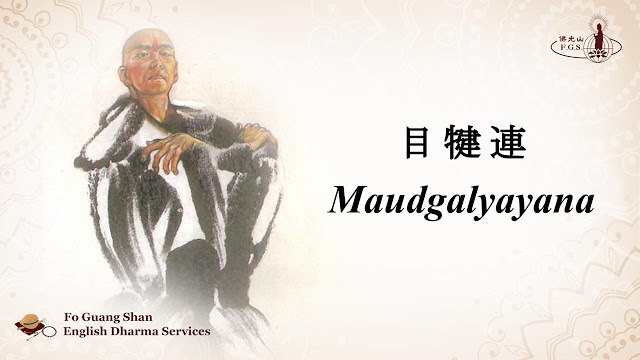
Maugalyayana’s Upbringing & Renunciation
Next, Sariputra’s best friend Maudgalyayana, who foremost in supernatural powers
He was born in a Brahman family in Magadha, India.
Both Maudgalyayana and Sariputra ordained as monks under the Buddha.
Maudgalyāyana attained arhatship with supernatural powers 7 days after ordaination.
Both Maudgalyāyana and Sariputra were Buddha’s chief disciples in the Sangha order.
Quite often, in the drawing, we can see Maudgalyāyana always stood on Buddha’s left while Sariputra stood on his right.
Maugalyayana’s Supernatural Power
Why Maudgalyayana has such supernatural powers?
In his past life, he was a fisherman. He realized that earning his livelihood by catching fish would result in Bad karma and one must cultivate merits for a better future life.
He decided to change his life. Once , he met a pratyeka-buddha and was impressed with his dignified manner so he invited the pratyeka-buddha to his house to receive offerings. The pratyeka-buddha was not good in preaching, he could only use his divine powers to save the world. After his meal, he jumped into the air and moved freely in all directions. Maudagalyayana was so impressed that he vowed to attain supernatural powers in his next life.
He finally achieved pre-eminence in supernatural powers during his next life when he was Buddha’s disciple.
Maugalyayana Saved His Mother
Maudgalyāyana was noted for his filial piety!
When he saw his mother suffering in the realm of Hungry Ghosts. He was very sad and tried to use his supernatural power provided a bowl of rice for his mother.
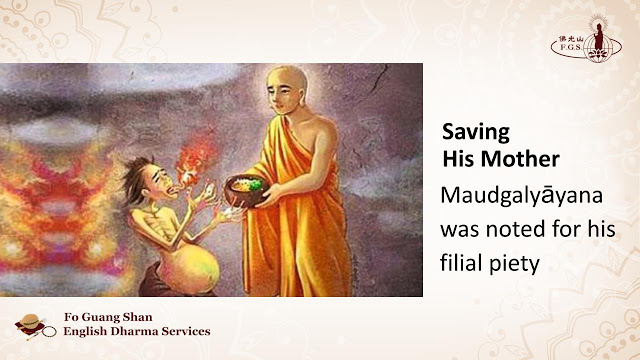
However, when the rice reached his mother’s mouth, it turned into charcoal and could not be eaten. Thought he has supernatural power, he could not explain his mother’s suffering. So he asked the Buddha.
Buddha explained, “Maudgalyāyana, your mother had in her previous life, slandered the Buddha and the Sangha. Moreover, she did not believe in retribution and had been greedy and hot-tempered. That is why she is receiving such a retribution. The reason why you do not know your mother’s karma is that your miraculous power has been hindered by the love between mother and son!”
“Lord Buddha, is there any way to help my mother get out of the realm of hungry ghosts?” Maudgalyāyana asked earnestly.
“Maudgalyāyana, you cannot save you mother on your own because of her bad karma. The only way is to rely on the powers of the holy monks to help her free from the suffering in the realm of hungry ghosts.
“The fifteenth of the seventh lunar month every year is the last day of summer rain retreat for all monks and many of them will have attained enlightenment by then. If one makes offerings to all holy monks on this day, he can rely on their united efforts to release his parents and relatives from the suffering. If his parents are alive, they will live a longer and happier life.”
Maudgalyāyana followed Buddha’s instructions and made offerings to all monks on the last day of summer rain retreat. His mother immediately freed from her suffering.
This is the origin of the Ullambana Festival.
Limitation of Supernatural Powers
Here is another story of The Limitations of Supernatural Powers
When the Buddha‘s homeland Kapilavastu was invaded by King Vidudabha of Kosala, Maudgalyāyana insisted on saving the clan people with his miraculous power despite Buddha explained this was due to the karma of Sakya clan.
He flew into Kapilavastu and selected the five hundred outstanding Sakyas and put them in a bowl. When he had safely flown out of the country, he opened the bowl and found that the five hundred people in it had already turned into a flood of blood!
Maudgalyāyana then realised one could not violate the law of cause and effect taught by the Buddha. Even supernatural power could not out match karmic effect.
Maudgalyāyana propagating the Buddha Dharma even when he was getting older. This had invited the jealousy of the heretics. They could not harm the Buddha but they awaited a chance to kill Maudgalyāyana.
Death of Maugalyayana
Once, while Maudgalyāyana was on a mission of propagating the Dharma, the heretics saw him passing by the foot of a hill. They pushed some heavy rocks down the hill and Maudgalyāyana was crushed to death!
Many Bhikkhus wondered why Maudgalyāyana did not use his great supernatural powers to resist the heretics.
The Buddha said, “Bhikkhus, Maudgalyāyana could have protected himself with his miraculous power. But he knew that no one could escape the karmic result due to cause and effect. Since he killed many lives in his previous life, he had to go through this karmic effect. In addition, he had vowed to devote his life to the Truth. As his wish had come true, he gladly entered Nirvana.”
4. Conclusion
Dear friends, among the 10 great disciples of Buddha, Sariputra and Muadgalyayana were the Heretics top scholars and leaders.
Once they ordained under the Buddha, they have strong faith in Dharma, and high respect for the Buddha. They never criticized the Buddha. We as a Buddhist, we should learn from them.
Thank you for joining this online English Dharma Service.
Let’s us join our palms and dedicate the joy and merits from this session, to all sentient beings, may all free from the suffering.

